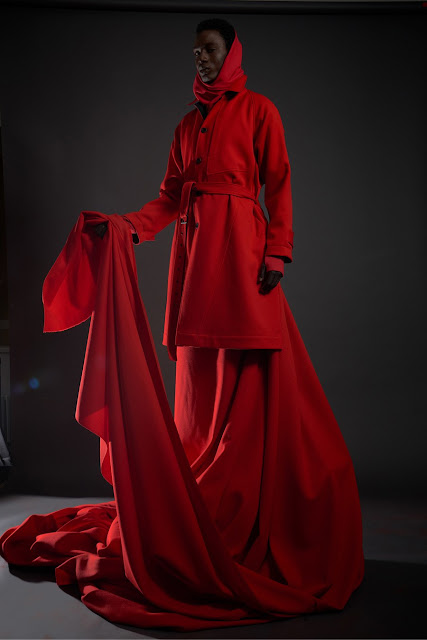Abasi Rosborough. Menswear Fall 2019 – New York Fashion Week
(Images from Vogue.com and wwd.com and the public domain. All rights. Used in promotion of the designer.)
The fashion industry is compressing, which of course makes sense, despite the normalcy of business cycles disrupted by low interest rates and easily available credit of more than a decade of excess. One could be mistaken that we are in boom time, which is further from the truth. As acquisitions are sought, with many younger designers looking to sell out as quickly as they can and/or collaborate with a multinational sports brand. The acquiring of smaller brands will crunch down at some point, if it hasn't already. To survive the retraction of hype around brands and chasing markets, in most cases don't exist sans the Chinese consumer buying up designer brands. The only avenue left for smaller clothing brands is to fall back onto the sustainable and slow fashion cues, which if achieved with sincerely holds merit, rather than sourcing a trend. Deadstock fabrics and recycling of materials is the new catch cry, that can assist a smaller brand in two ways, one it reduces manufacturing of creating fabrics (expensive) through industry mills, two, they can reconfigure the projection line and establish a more exclusive range with recycled materials. All will assist in reducing overheads, whilst servicing products made to order. Such as the designs Abdul Abasi and Greg Rosborough have chosen to do with their Signature brand Abasi Rosborough.
Setting up their Fall 2019 Menswear collection as a lookbook of 12 pieces, is indicative of maintaining tighter market conditions. Yes, a bigger more cashed up company could weather a storm, of course pending its liabilities. A smaller company with less overheads may take a big hit and fall back towards zero, which could make or break an independent fashion brand. But, hold the name and make it through the storm. Maybe you'll come out in one piece. Hard to say, but, admirable when the smaller companies, sometimes do make it out. They become stronger. Abasi Rosoborough are offering their sourced deadstock and natural fabrics as a defining representation via lookbook styles. Heavy set and fine wools overlays and rayon materials or portrayed as examples of show pieces.
The fascination with recycled materials will continue into 2019, as the masses of natural and synthetic clothing accumulate within storage facilities. The problem with deadstock materials is the occurrence of dry-rot and silverfish (they also eat synthetics). This will pose as a challenge for designers looking through the stockpiles of disused fabrics as they embark on the sustainability trend.






Comments
Post a Comment